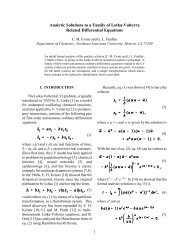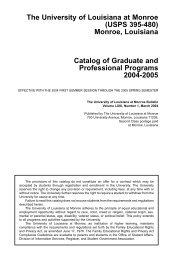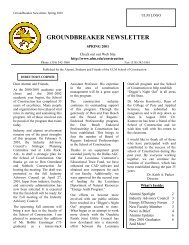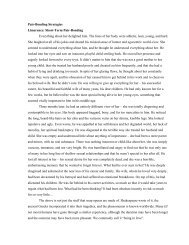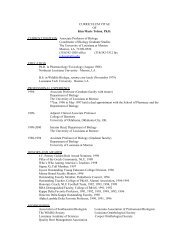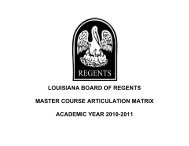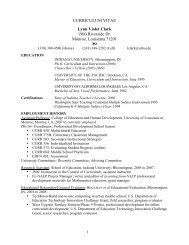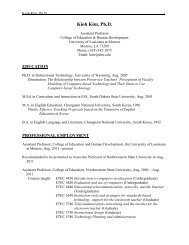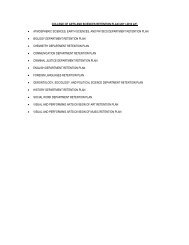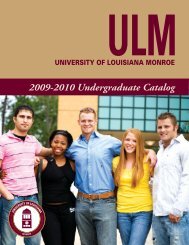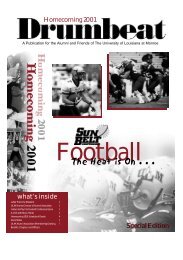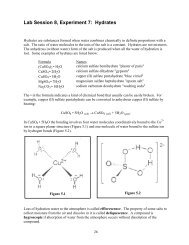Undergraduate Catalog - University of Louisiana at Monroe
Undergraduate Catalog - University of Louisiana at Monroe
Undergraduate Catalog - University of Louisiana at Monroe
Create successful ePaper yourself
Turn your PDF publications into a flip-book with our unique Google optimized e-Paper software.
236 UNIVERSITY OF LOUISIANA MONROE 2012-2013 UNDERGRADUATE CATALOG<br />
SOCIAL WORK<br />
(SOCW)<br />
This undergradu<strong>at</strong>e Social Work program is<br />
accredited by the Council on Social Work Educ<strong>at</strong>ion<br />
(CSWE). The primary objective <strong>of</strong> the major is to prepare<br />
students for beginning pr<strong>of</strong>essional social work practice.<br />
Required for a major: Social Work 1001, 1002, 2005,<br />
3001, 3003, 3005, 3015, 4016, 4021, 4022, 6 hours <strong>of</strong><br />
Social Work electives and Sociology 4050 and a grade<br />
<strong>of</strong> “C” or higher in all courses required for a major—Total<br />
<strong>of</strong> 39 semester hours. A grade <strong>of</strong> “C” or above must be<br />
achieved in prerequisite courses prior to enrollment in<br />
higher level courses.<br />
Students may choose to complete a minor as part <strong>of</strong><br />
their free electives.<br />
For <strong>Undergradu<strong>at</strong>e</strong>s Only<br />
1001. INTRODUCTION TO SOCIAL WORK. 3 cr. The historical<br />
development <strong>of</strong> the social work pr<strong>of</strong>ession to the present. The<br />
knowledge, values, and skills required for the pr<strong>of</strong>ession are<br />
identified. The role <strong>of</strong> social workers in various fields <strong>of</strong> social<br />
work practice is described.<br />
1002. SOCIAL WELFARE AS AN INSTITUTION. 3 cr. The structure<br />
and function <strong>of</strong> public and priv<strong>at</strong>e agencies th<strong>at</strong> have been<br />
developed to help meet human needs. This course will integr<strong>at</strong>e<br />
society’s values with program services provided to prevent or<br />
allevi<strong>at</strong>e social problems experienced by individuals, groups and<br />
communities.<br />
2005. HUMAN BEHAVIOR AND SOCIAL ENVIRONMENT I. 3 cr.<br />
An introduction to basic principles and fundamental concepts<br />
necessary for acquiring and organizing knowledge about human<br />
behavior and the social environment. Concentr<strong>at</strong>ion on the<br />
stages <strong>of</strong> individual development from birth to old age. Students<br />
are required to volunteer 30 clock hours in an agency approved<br />
by the classroom instructor. Prerequisites: SOCW 1001 and<br />
1002 or approval <strong>of</strong> department head and/or instructor.<br />
3001. INTERVIEWING AND THE HELPING RELATIONSHIP. 3 cr.<br />
Develops theoretical knowledge and practical skills in interviewing,<br />
and recording by studying concepts, principles, and techniques<br />
in the classroom and by applying them in role-play interview<br />
situ<strong>at</strong>ions. Students are required to volunteer 30 clock hours in an<br />
agency approved by the classroom instructor. Prerequisites: SOCW<br />
1001, 1002, and 2005 and Social Work major.<br />
3003. SOCIAL POLICY AND SOCIAL WORK. 3 cr. Learning to identify<br />
and analyze the processes <strong>of</strong> social policy decision-making in the<br />
social, political, and economic arenas. Examines societal values<br />
and ideologies which rel<strong>at</strong>e to the development <strong>of</strong> social policies<br />
and programs. Prerequisites: SOCW 1001, 1002 and Social<br />
Work or Pre-Social Work major. Offered to non-majors who have<br />
completed the <strong>University</strong> core English composition, humanities,<br />
social sciences requirements with the permission <strong>of</strong> department<br />
head and/or instructor.<br />
3005. HUMAN BEHAVIOR AND SOCIAL ENVIRONMENT II. 3 cr. An<br />
introduction to knowledge, theories, and concepts about human<br />
behavior from the perspective <strong>of</strong> mezzo systems interactions<br />
with micro and macro systems. Prerequisite: SOCW 1001;1002;<br />
and 2005 and Social Work or Pre-Social Work major. Offered<br />
to non-majors who have completed the <strong>University</strong> core English<br />
composition, humanities, social sciences requirements with the<br />
permission <strong>of</strong> department head and/or instructor.<br />
3015. PRACTICE I. 3 cr. The focus <strong>of</strong> this course is to enhance and<br />
develop the skills necessary for generalist social work practice<br />
with micro and mezzo client systems. Utiliz<strong>at</strong>ion <strong>of</strong> an ecological<br />
systems approach to assessing and addressing problems in<br />
living is examined The impact <strong>of</strong> human diversity on the practice<br />
intervention is emphasized. Prerequisites: SOCW 2005 and 3001<br />
and Social Work major.<br />
3020. FUNDAMENTALS OF CASE MANAGEMENT. 3 cr. This course<br />
introduces students to the concept <strong>of</strong> case management and<br />
how it is used to provide human services. Students will explore<br />
the many factors affecting case management today including<br />
federal legisl<strong>at</strong>ion, emerging client groups, technology, shifting<br />
demographics, new service delivery models, and the resulting<br />
ethical and legal dilemmas. Pre-requisites: SOCW 1001, 1002<br />
and Social Work or Pre-Social Work major. Offered to non-majors<br />
who have completed the <strong>University</strong> core English composition,<br />
humanities, social sciences requirements with the permission <strong>of</strong><br />
department head and/or instructor.<br />
4004. SOCIAL AND EMOTIONAL ASPECTS OF DISABILITIES. 3 cr.<br />
The course examines physical and developmental disabilities<br />
from four basic perspectives using an interdisciplinary ecological<br />
approach: (1) physical and medical aspects <strong>of</strong> disabilities; (2)<br />
psychosocial and emotional aspects <strong>of</strong> disabilities; (3) micro and<br />
macro-level intervention approaches and (4) advocacy, policymaking,<br />
and legisl<strong>at</strong>ive efforts by and on behalf <strong>of</strong> people with<br />
disabilities <strong>at</strong> the local, st<strong>at</strong>e, and n<strong>at</strong>ional levels. Prerequisites:<br />
Junior level standing or permission <strong>of</strong> the department head and/<br />
or the instructor.<br />
4005. DIFFERENTIAL DIAGNOSIS. 3 cr. An organized introduction to<br />
and synopsis <strong>of</strong> the criteria for understanding and interpreting<br />
individual diagnoses in the DSM-IV and other diagnostic tools<br />
rel<strong>at</strong>ed to the functionality <strong>of</strong> human behavior in the context <strong>of</strong><br />
diverse social systems. Prerequisites: PSYC 2001 and 4001 and<br />
junior standing.<br />
4015. QUALITATIVE RESEARCH IN SOCIAL WORK PRACTICE. 3<br />
cr. This course is intended to provide the students with the basic<br />
skills needed to do qualit<strong>at</strong>ive research. This course examines<br />
special problems in social work and human service provision<br />
using qualit<strong>at</strong>ive research methods. Prerequisites: junior standing<br />
or approval <strong>of</strong> department head and/or instructor.<br />
4016. PRACTICE II. 3 cr. Generalist social work theory and its<br />
applic<strong>at</strong>ion <strong>at</strong> the macro level <strong>of</strong> practice. This course will focus<br />
on the applic<strong>at</strong>ion <strong>of</strong> social work skills <strong>of</strong> assessment and<br />
problem-solving <strong>at</strong> the organiz<strong>at</strong>ional and community level. To be<br />
taken concurrently with Social Work 4021 and 4022. Social Work<br />
majors only.<br />
4021. FIELD EDUCATION IN SOCIAL WORK. 6 cr. Supervised<br />
practice in an approved social work agency for four full days<br />
weekly. Fall or Spring enrollment. Applic<strong>at</strong>ion must be made in<br />
the first month <strong>of</strong> the semester prior to enrolling in Field Work.<br />
Prerequisites: Completed all 1000 and 2000 level courses,<br />
earned a grade <strong>of</strong> “C” or higher in all courses required for a<br />
major, and earned a GPA <strong>of</strong> 2.3 in all courses required for the<br />
degree. During enrollment in Field Educ<strong>at</strong>ion, the student will<br />
enroll in Social Work 4016 and 4022. One additional course may<br />
be taken during this semester. Social Work majors only.<br />
4022. FIELD EDUCATION SEMINAR. 3 cr. To be taken by all students<br />
enrolled in SOCW 4021, FIELD EDUCATION IN SOCIAL<br />
WORK. The course content is integr<strong>at</strong>ed with the field practicum<br />
experience. This is a capstone course addressing m<strong>at</strong>erials<br />
covered in all social work found<strong>at</strong>ion areas from the perspective<br />
<strong>of</strong> a generalist social work practitioner. Emphasis is on value<br />
and ethics, diversity, research, social and economic justice, and<br />
popul<strong>at</strong>ions-<strong>at</strong>-risk. The formal evalu<strong>at</strong>ion <strong>of</strong> social work students<br />
is conducted via an exit exam and an assessment <strong>of</strong> written and<br />
oral communic<strong>at</strong>ion skills. Social Work majors only.<br />
4035. DIRECTED STUDY. 1-3 cr. Guided readings in selected areas<br />
directed by instructor on an individual basis. May not be taken for<br />
more than three credits. Prerequisite: Junior standing and prior<br />
approval by supervising pr<strong>of</strong>essor.<br />
For <strong>Undergradu<strong>at</strong>e</strong>s and Gradu<strong>at</strong>es<br />
4001. THE CHILD AND THE COMMUNITY. 3 cr. Examines the<br />
common and particular needs <strong>of</strong> children in the community, social<br />
welfare services and resources developed by communities for the<br />
care and training <strong>of</strong> children. Prerequisites: Junior standing or<br />
by approval <strong>of</strong> department head and/or instructor.



